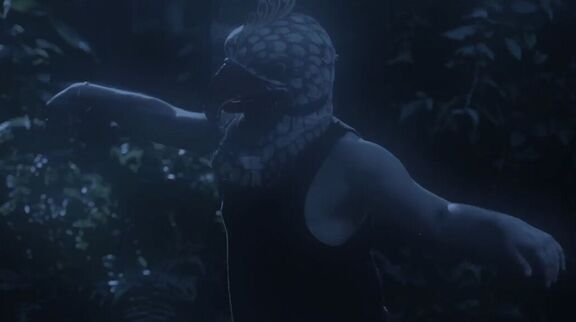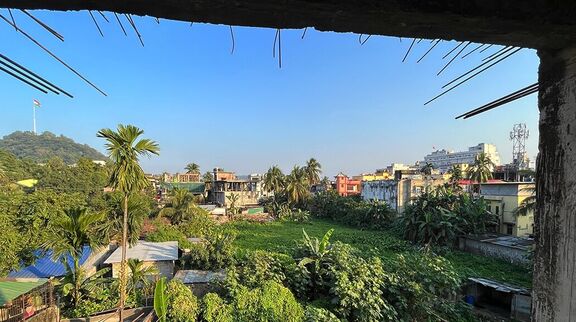Glasmoog – Raum für Kunst & Diskurs


What's next
Filmscreening & Talk: Cinema as Invocation, with Mriganka Madhukaillya, Stephen Zepke (in English)

Der Filmemacher und Künstler Mriganka Madhukaillya ist derzeit Artist-in-Residence der Akademie der Künste der Welt. Zu Gast an der KHM präsentiert er seinen Film "Invocation" (2015), der ursprünglich im Auftrag des British Museum erstellt wurde, und diskutiert im Gespräch mit dem Philosophen Stephen Zepke die Frage, wie das Kino aus der Perspektive indigener Ontologien heraus neu gedacht werden kann.
What does it mean to rethink cinema from an ontological perspective? It means acknowledging the different ontologies operating in cinema, and the very different functionalities they allow. Mriganka Madhukaillya’s work as an artist and theorist takes up this challenge, employing the beliefs and practices of indigenous cultures from Assam, the region of India where he comes from, to interrogate Western modes of cinematic production and the wider structures that enforce their dominance.
Mriganka will present his film Invocation (2015), which was commissioned by the British Museum to investigate the Vrindabani Vastra, an Assamese textile woven the seventeenth century depicting illustrations of Lord Krishna’s childhood in over 9 meters of length. Rather than investigating these images, the film acts as an invocation, calling the illustrations of Lord Krishna’s childhood on the textile into the present in order to propose an alternative, but nevertheless viable world. Invocation draws on the mythologies and ritual performance practices woven into the Vrindabani Vastra in order to utilize them in and against contemporary technologies, seeking to connect them to the affective methodologies of our cybernetic world. Two important aspects of the vision of the future offered by Vrindabani Vastra are social change based on inclusion and religious syncretism, and the central role of a participatory and experimental performance practice in invoking the holy. The Vrindabani Vastra was central to this happening: in the process of weaving, as a hanging piece in the holy space, and in the performances that activated it through dances and rituals, in which both participants and spectators could experience a reconfiguration of their social and religious lives.
In conversation with the philosopher Stephen Zepke, Mriganka will discuss about the ways in which the truths and dreams of indigenous ontologies can be invoked through contemporary cinema in order to reanimate, and redirect our bodies and minds, drawing also on Zepke’s own work on the sublime in contemporary art and cinema.
Mriganka Madhukaillya is an artist and film-maker. Originally invested in documentary film work, as well as public events aimed at reviving a redundant space for discourse in India’s Northeast, Mriganka started developing projects with Desire Machine Collective and Periferry, which in time brought international attention to the singularity of the region. He is an assistant professor of New Media Technology and Cinema, as well as the founder of the Media Lab within the Department of Design at the Indian Institute of Technology, Guwahati.
With a background in quantum mechanics and communication design, he has conducted research and taught at universities worldwide. He was a DAAD visiting professor at Merz Akademie, Stuttgart in 2019, and a visiting professor at the China Academy of Arts in Hangzhou in 2016-17. He is currently a member of the research networks Biopolitica, and Substantial Motion Research Network (initiated by Prof. Laura Marks and Prof. Azadeh Emadi). At present, Mriganka is developing the research and design studio Forest Cybernetics, whose main project is the pedagogical lab Library in the forest.
Stephen Zepke is an Independent Researcher based in Vienna. His research focusses on the intersections of philosophy, politics and contemporary art. His recent books include the collected volume Violence and Resistance, Art and Politics in Colombia (2023, edited with Nicolas Alvarado Castilla), Towards a New ‘New Brutalism’, Wandering Around Robin Hood Gardens (2022), Head in the Stars, Essays on Science Fiction (2020), La Sensación Más Allá de Los Límites, Ensayos sobre arte y política (2019), and Sublime Art; Towards an Aesthetics of the Future (2017).
GLASMOOG
Raum für Kunst & Diskurs
Filzengraben 2
D-50676 Köln
Die Öffnungszeiten variieren momentan je nach Ausstellung.
Postanschrift
GLASMOOG
Kunsthochschule für Medien Köln
Peter-Welter-Platz 2
D-50676 Köln
Tel.: +49 221 - 20189 - 213
Fax: +49 221 - 20189 - 49213
E-Mail: glasmoog@khm.de
Don't miss a thing!
Wenn Sie regelmäßig digitale Einladungen zu den Ausstellungen und Veranstaltungen von Glasmoog erhalten wollen, bitte melden Sie sich hier für den Newsletter an. Vielen Dank.




